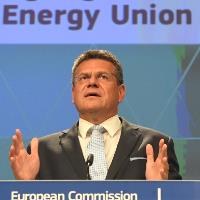(BRUSSELS) – Member States’ plans to implement EU objectives for meeting energy and climate targets fall short on renewables and energy efficiency, the Commission said Wednesday in its assessment of the plans.
The assessment of Member States’ draft plans to implement the EU’s Energy Union objectives, with specific focus on agreed EU 2030 energy and climate targets, have to be finalised by the end of the year.
In its assessment, the Commission welcomes ‘significant efforts’ but points to areas where there is room for improvement, notably as concerns targeted and individualised policies to ensure the delivery of the 2030 targets and to stay on the path towards climate neutrality in the longer term.
The European Union is the first major economy to put in place a legally binding framework to deliver on its pledges under the Paris Agreement and this is the first time that Member States have prepared draft integrated national energy and climate plans (NECPs). Yet, with plans currently falling short both in terms of renewables and energy efficiency contributions, the EU executive says reaching the EU’s overall climate and energy goals will require a ‘collective step up of ambition’.
“Member States have all produced impressive drafts in a relatively short time, but no draft is perfec,” said EC Energy Union vice-president Maros Sefcovic: “Final plans are due by the end of the year and our recommendations show where more effort is needed: for example, stronger ambition, more policy detail, better specified investment needs, or more work on social fairness.”
Climate Action Commissioner Miguel Arias Canete said: “Last November we proposed that the European Union should become climate neutral by 2050. We have shown and led the way forward. It is good to see that a growing number of Member States are following our lead and working towards that goal. Having evaluated Member States draft national plans, I am positive about the significant efforts that have been made. However, in the final plans even more ambition is needed to set the EU on the right track in fighting climate change and modernising our economy.”
The EU is committed to delivering on its commitments to reduce greenhouse gas emissions and to delivering secure, affordable and sustainable energy for its citizens. This system of energy and climate governance means both the Union and its Member States ‘plan together and deliver collectively’ on its 2030 targets and ‘on a socially-fair and cost-effective transition to a climate neutral economy by 2050’.
In its analysis of the draft national plans, the Commission looked at their aggregated contribution to meeting the EU’s Energy Union objectives and 2030 targets. As they stand, the draft NECPs fall short both in terms of renewables and energy efficiency contributions. For renewables, the gap could be as big as 1.6 percentage points. For energy efficiency, the gap can be as big as 6.2 percentage points (if considering primary energy consumption) or 6 percentage points (if considering final energy consumption).
Member States now have 6 months to raise their national level of ambition, says the Commisison. The Commission’s recommendations and detailed assessments aim to help Member States finalise their plans by the end of 2019, and to implement them effectively in the years to come. It is hoped the national plans will provide clarity and predictability for businesses and the financial sector to stimulate necessary private investments. The plans will also facilitate Member States’ programming of funding from the next multi-annual financial framework 2021-2027.
EU Energy Union laws require Member States to take due account of the Commission’s recommendations or make public their reasons not to. Member States are also required to involve the public in the preparation of the final plans by the end of the year.
The deadline for submitting the final plans is set for 31 December 2019. These recommendations are part of a ‘back and forth’ process with Member States aimed at ensuring that the final versions of the NECPs are detailed, robust and ambitious.
The Commission says it stands ready to support Member States in their efforts to finalise their NECPs by the end of 2019, building on the excellent cooperative process to date.
National energy and climate plans – background guide



